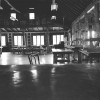all content © Albert J. Winn 2013
Summer Joins The Past
Summer camp was once an important part of the cultural landscape of the Jewish adolescent experience in the United States. Camps provided a sense of community and reinforced group identity, engendered their own allegiances, and fostered networks of relationships that extended into adulthood. Started in the early years of the twentieth century as a refuge from congested slums, summer camps became vehicles for assimilation into the American mainstream, combining Native-American and American folklore, sports, and arts and crafts activities in a Jewish cultural setting. For the entire summer, camp became an ideal community of children, removed from home and parents, mythological places of friendship, achievement, romance and promise. Although camps still exist, they reached their heyday in the 1950's and 60's. The photographs shown here are of summer camps from a variety of locations throughout North America. Part of a larger body of work, they address the issues of memory, nostalgia, loss and myth associated with landscapes. In ‘Landscape and Memory,’ Simon Schama addresses the notion that mythology imbued in certain places creates metaphor that is greater than its references. The myths that surround summer camp, like those of any other place that represent an ideal, have a resiliency greater than the actual experience, and as such become constructs of metaphor. As a long-term survivor of AIDS, the empty spaces have a special resonance for me. Devoid of the vitality for which they were created, they are not only the reminder of the loss of an ideal but also of lives lived and lost. Larry Kramer, the AIDS activist and writer, speaking about the ravages of the plague, once described a feeling about New York. "The New York I love is gone now. When I walk down the streets there, all I see are dead people." I, too, have experienced something similar, but instead of dead people, I sense emptiness. At first, I thought of photographing deserted street scenes of New York and other cities that have large gay populations and had experienced enormous loss from AIDS. But, as someone who attended summer camp for many years, it seemed only natural for me to return to that landscape for this series. I always wondered how camp would look when no one was there. Would the landscape hold the same resonance as empty spaces as they did in my memory or would they speak to something else? ‘Summer Joins the Past,’ the title of this series, is taken from a lyric of a song written at Akiba, a camp I attended and a place I have returned often in memory. The scenes of vacant and deserted spaces were more evocative and haunting than I imagined.






















